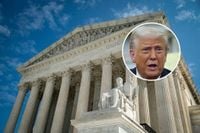The United States Supreme Court on Saturday issued a temporary order blocking President Donald Trump from carrying out the deportation of a group of Venezuelan migrants accused of gang involvement. In a decisive 7-2 vote, the court barred the Trump administration from removing Venezuelans held at the Bluebonnet Detention Center in Texas under the 1798 Alien Enemies Act, stating that the government is directed not to remove any member of the putative class of detainees from the United States until further order of this court.
This ruling came after a legal battle initiated by the American Civil Liberties Union (ACLU), which filed an emergency appeal on behalf of the detainees, asserting that they faced imminent removal without due process. ACLU lawyer Lee Gelernt expressed relief at the court's decision, stating, "We are deeply relieved that the court has temporarily blocked the removals. These individuals were in imminent danger of spending the rest of their lives in a brutal Salvadoran prison without ever having had any due process."
The Supreme Court's ruling follows reports that more than 50 Venezuelans were scheduled for deportation to the Centre for Terrorism Confinement in El Salvador, a facility known for housing gang members. The Trump administration had been relying on its relationship with El Salvador's President Nayib Bukele to facilitate these deportations, targeting individuals suspected of gang affiliations.
The legal framework for these deportations is rooted in the Alien Enemies Act of 1798, a wartime law that has been criticized for its application in this context. This law allows the president to detain and deport individuals from enemy nations during times of war. Critics argue that using such an antiquated law to justify the deportation of alleged gang members is a misapplication of its intended purpose.
Justices Clarence Thomas and Samuel Alito dissented from the majority opinion, highlighting a split within the court's conservative wing. The court's decision to pause the deportations comes amidst ongoing litigation regarding the legality of using the Alien Enemies Act in this manner. The Supreme Court had previously ruled that deportations could only proceed if detainees were afforded the opportunity to contest their removals in court.
The urgency of the ACLU's appeal was underscored by reports that some of the detainees had already been loaded onto buses, indicating that deportations were imminent. During a hearing on Friday, a government lawyer stated that while there were no immediate plans for deportations that day, the Department of Homeland Security (DHS) reserved the right to proceed with removals.
This case is not isolated; it follows a series of deportations in March 2025, during which the Trump administration sent 238 alleged Venezuelan gang members and 23 members of a Salvadoran gang to a maximum-security prison in El Salvador. Among those deported was Kilmar Abrego Garcia, a Maryland resident who had secured a protection order against his removal. The Trump administration later acknowledged that it had mistakenly deported Garcia, yet it has refused to comply with a Supreme Court order to return him to the U.S.
Senator Chris Van Hollen, who met with Garcia in El Salvador, criticized the Trump administration for blatantly defying the Supreme Court's orders. He emphasized that this case transcends the individual circumstances of one man, highlighting the broader implications for due process rights for all individuals residing in the United States.
The Supreme Court's ruling has significant implications for the ongoing legal battles surrounding immigration policy and executive power. With the court's conservative majority, this case may set a precedent for how similar deportation cases are handled in the future, particularly those invoking historical wartime laws.
As the legal landscape continues to evolve, the ACLU and other advocacy groups remain vigilant, prepared to challenge any future attempts by the Trump administration to expedite deportations without due process. The Supreme Court's temporary order serves as a crucial reminder of the importance of judicial oversight in immigration matters, particularly in cases involving vulnerable populations.
The White House has yet to comment on the Supreme Court's ruling, but the administration's approach to immigration policy has faced increasing scrutiny from both legal experts and civil rights advocates. As the situation develops, it remains to be seen how the Trump administration will respond to the court's directive and what the future holds for the detainees currently held in Texas.










